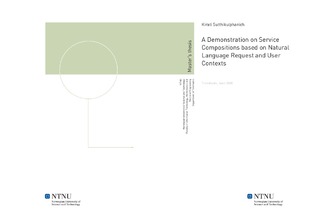| dc.description.abstract | The significant growth in mobile markets exposes business niches. A number of heterogeneous services have been offered to end users by several service providers. The end users can fully benefit from wide varieties of services only when these heterogeneous services can be composed together (i.e. service composition is created). This fact motivates an invention of frameworks that support diverse features such as service creations and compositions. The frameworks aid new market players to enter and offer innovative services. Such frameworks could benefit users by offering a big pool of services, and service providers by simplifying deployment process in adopting groundbreaking services. To achieve this, SPICE (Service Platform for Innovative Communication Envi-ronment) project has been established. In SPICE project, the researchers have developed, among other things, two environments: a Service Creation Environment (SCE) and a Service Execution Environment (SEE). An objective of SCE is to create and compose web services and Telecommunication services. An objective of SEE is to execute compositions of the services created by SCE. Main component developed in SCE is Automatic Composition Engine (ACE). ACE dynamically constructs service composition that satisfies a request of service developers. The request has to be constructed in a formal way. Therefore, the informal request such as natural language request (i.e. in English) needs to be transformed into a formal service com-position request before it is sent to the ACE. Thus, clients of ACE are only limited to service developers who have enough knowledge to construct the formal request. To bring SCE out to the market where end users do not possess much of technical knowledge, this thesis proposes a development of Intelligence Agent (IA) as a new component of SCE. IA construct service composition from an informal request in natural language by using Natural Language Processing (NLP) technique. A context handling feature has also been considered in this thesis. In SPICE project, the researches have developed Knowledge Management Framework (KMF) that supports context handling. This thesis demonstrates a possibility to integrate IA with KMF so as to improve SCE. As a result of this thesis, we have developed a prototype of IA. IA receives a request from end user in natural language (English), analyze the request, search and compose for service composition candidates that satisfy the request and deploy the candidates into an artificial language, SPATEL. We have also developed a module of IA that registers and subscribes for a user context published by a knowledge source in KMF framework. IA takes into account a context of user (e.g. user location, user authentication) when it selects services from the service repository. IA also ensures that the desired service composition will be deployed when certain condition on user context arises. | nb_NO |

